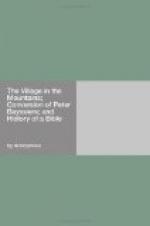When I reached the sixty-third verse, I was struck as by a flash of light, which instantaneously discovered to me the mistake that I had at first made in the meaning of the six verses transcribed above, and imparted a new value to the Gospel. When I read “It is the Spirit that quickeneth, the flesh profiteth nothing—the words that I speak unto you, they are Spirit, and they are Life,” John, 6:63, I had, as it were, the key of the chapter, and no longer discerned in it the doctrine of the real presence. I perceived that it in no way referred to swallowing and digesting, with our corporeal organs, the body and blood of Christ: I saw that the expressions of eating and drinking were used figuratively, and that they really signified nothing but knowing Christ, coming to him, and believing in him, as it is explained in the thirty-fifth verse of the same chapter, where Jesus Christ says, “I am the bread of life; he that cometh to me shall never hunger, and he that believeth on me shall never thirst.”
It was, then, as clear to me as the day, that Jesus Christ used the terms eating and drinking only in a spiritual manner; and (as I now understand them) as referring to that faith, which, while it is living and active in our hearts, unites us to him in an inexplicable manner, and clothes us in his merits at the same time that it purifies and sanctifies our views, our sentiments, and our desires. After having thus discovered my error, I found myself more than ever inclined to persevere in my reading, and to search and see whether the doctrine of the real presence would not he better established in the subsequent parts of the book. The further I advanced, my dear children, the more reason I had to be convinced that neither Jesus nor his apostles ever intended to convey such an idea. I should be too tedious were I to point out to you all the passages which I found expressly contradictory to this revolting tenet; it will be sufficient to quote a few.




